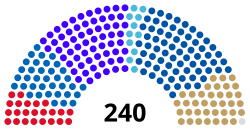49th National Assembly of Bulgaria
49th National Assembly 49-то Народно събрание | |
|---|---|
| History | |
| Founded | April 12, 2023 |
| Disbanded | June 19, 2024 |
| Preceded by | 48th National Assembly |
| Succeeded by | 50th National Assembly |
| Leadership | |
Vacant | |
Deputy Speakers | |
| Structure | |
| Seats | 240 |
 | |
Political groups | Government (132)
Opposition (72)
|
| Meeting place | |
| National Assembly Building, Sofia | |
| Website | |
| parliament.bg | |
The Forty-Ninth National Assembly (Bulgarian: Четиридесет и деветото народно събрание) was a convocation of the National Assembly of Bulgaria, formed according to the results of the early parliamentary elections in Bulgaria, held on 2 April 2023.[1] It was replaced by the 50th National Assembly, summoned by the President on the 17th of June.[2]
Speakership selection
[edit]Despite each parliamentary group having the right to nominate a candidate for the Speakership role, it was contested only between GERB’s Rosen Zhelyazkov and Revival’s Petar Petrov. The process failed twice due to Petrov only receiving the support of his own party and Zhelyazkov not getting enough votes. The problem was resolved after PP-DB agreed to back Zhelyazkov's candidacy, with the agreement for him to switch places with Nikola Minchev in three months time.[3] This was later changed, after the two parties agreed to a rotation government, in which the Prime Ministers would switch places simultaneously as the Speakers of the National Assembly.[4]
Government formation
[edit]With Bulgaria being in the middle of an already 2-year-lasting political crisis, the GERB-SDS and PP-DB parliamentary groups decided to disregard their differences and embrace their common pro-European goals. The solution was to be a rotation government, many of whose Ministers were to be Independent experts. The respective nominees for Prime Minister were Mariya Gabriel,[5] the European Commissioner for Innovation, Research, Culture, Education and Youth and Nikolay Denkov,[6] a former Minister of Education and Science. After long negotiations, Nikolay Denkov was sworn in as Prime Minister on June 6, 2023, while Gabriel assumed the role of his Deputy and Minister of Foreign Affairs.[7] The two would switch places in nine months time. The main goals of the new Government were Bulgaria joining both the Schengen area and the Eurozone, as well as other legislative initiatives, such as a constitutional amendment in regards to the judicial branch in Bulgaria.[8]
Independents
[edit]The parliamentary group of Revival party initially won 37 seats in the National Assembly. However, 3 members later left the group, reducing their number of seats to 34. Similarly, the coalition PP-DB, which secured 64 seats, experienced the departure of 1 member, leaving them with 63 seats.
References
[edit]- ^ staff, The Sofia Globe (2023-04-10). "Bulgaria's newly-elected 49th National Assembly to hold first sitting on April 12". The Sofia Globe. Retrieved 2024-04-05.
- ^ "Президентът свиква първото заседание на 50-ото Народно събрание в сряда". Investor.bg (in Bulgarian). 2024-06-17. Retrieved 2024-07-04.
- ^ "Rossen Zhelyazkov of GERB-UDF to be elected as Speaker of 49th Parliament, rotation will be considered in three months - Българска национална телевизия". bnt.bg (in Bulgarian). Retrieved 2024-04-05.
- ^ "Шефът на парламента ще се върти заедно с министър -председателя (Обзор)". www.24chasa.bg. Retrieved 2024-04-05.
- ^ "EU's Mariya Gabriel nominated to be Bulgaria's new prime minister". POLITICO. 2023-05-10. Retrieved 2024-04-05.
- ^ "Chemistry professor becomes newest Bulgarian PM candidate". Retrieved 2024-04-05.
- ^ "Bulgaria's parliament elects new government led by PM Denkov". Retrieved 2024-04-05.
- ^ Tcherneva, Vessela (2023-06-27). "Cautious optimism: What Bulgaria's new government means for Europe". ECFR. Retrieved 2024-04-05.
